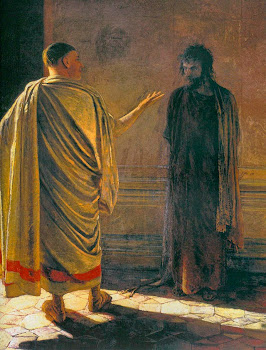Jesus and the Kingdom: Three Paradigms (Part 1)
Jesus answered them, “Go and tell John what you hear and see: the blind receive their sight, the lame walk, the lepers are cleansed, the deaf hear, the dead are raised, and the poor have good news brought to them. And blessed is anyone who takes no offense at me” (Matt. 4:11, NRSV).Scholarly portraits of the life and ministry of Jesus run the gamut from devoutly credulous to the stridently skeptical in terms of how the canonical Gospels and other early Christian sources are handled.
 Still, most interpreters seem to agree that the kerygma of the kingdom of God was the central content and focus of Jesus' teaching and ministry.
Still, most interpreters seem to agree that the kerygma of the kingdom of God was the central content and focus of Jesus' teaching and ministry.Of course, debate persists about just what the basilea tou theou might have meant for Jesus and his original audience: Is the kingdom a pious disposition ("within you") or a form of community life ("among you")? Or both? Is coterminous with the visible community of believers itself, the church catholic? Is it an ideal construct that spurs and shapes discipleship? Or is it a present possibility or a coming concrete socio-political order? These issues are very technical. Perhaps we can explore ways of relating Jesus' identity and vocation to the kingdom without defining the later term too rigidly. At least, that's what I want to try to do.
Christian interpreters throughout the centuries have sought to show how the kingdom, however defined, relates to the person and work of Jesus, both in his original self understanding and in the subsequent witness of the New Testament, to the extent those are consciously distinguished. This is a complex question, of course, but what I will be offering in the posts that follow is a rough typology of how Jesus himself might relate to the kingdom
- Jesus is the proclaimer of the kingdom.
- Jesus is the bringer of the kingdom.
- Jesus himself incarnates the kingdom in person.
Are you excited yet? Please stay tuned!
==================================
Follow @@jsjackson15
Comments